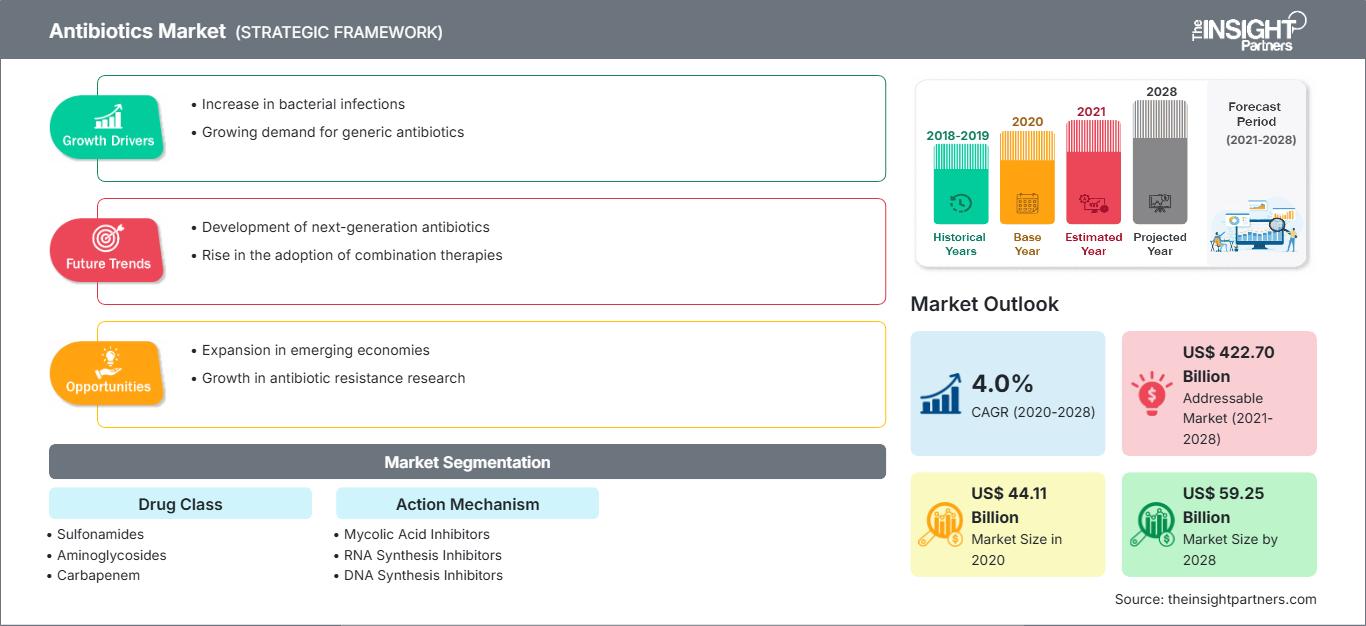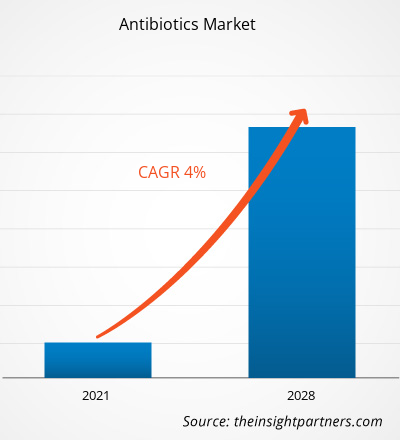Der Antibiotikamarkt wurde im Jahr 2020 auf 44.111,31 Millionen US-Dollar geschätzt und soll bis 2028 59.253,24 Millionen US-Dollar erreichen; für den Zeitraum 2021–2028 wird ein durchschnittliches jährliches Wachstum von 4,0 % erwartet.
Antibiotika sind wirksame Medikamente zur Bekämpfung bakterieller Infektionen und Erkrankungen. Sie werden insbesondere zur Behandlung von Infektionen durch Bakterien wie Staphylokokken, Streptokokken oder E. coli eingesetzt. Antibiotika töten die Bakterien entweder ab (bakterizid) oder hemmen ihre Vermehrung und ihr Wachstum (bakteriostatisch). Antibiotika wirken nicht gegen Virusinfektionen. Zu den häufigen Infektionen, die mit Antibiotika behandelt werden, gehören unter anderem Bindehautentzündung, Haut- oder Weichteilinfektionen, Infektionen der oberen Atemwege, Bronchitis, Streptokokken-Pharyngitis (Angina pectoris) und mehr.
Markteinblicke: Zunehmende Entwicklung von Generika
Ein Generikum ist eine Kopie eines Markenmedikaments, das nicht mehr patentgeschützt ist. Generika werden auf den Markt gebracht, um kostengünstige Medikamente anzubieten und diese Medikamenten Menschen aus verschiedenen wirtschaftlichen Schichten zugänglich zu machen. Generika sind aufgrund ihrer Verfügbarkeit und Erschwinglichkeit beliebt. Einer 2018 im NCBI veröffentlichten Studie zufolge war beispielsweise der durchschnittliche Preis für verschreibungspflichtige Markenmedikamente fast viermal so hoch wie der durchschnittliche Preis für Generika. Darüber hinaus konzentrieren sich die Unternehmen auch auf die Entwicklung von Generika, um Antibiotika zu möglichst geringen Kosten anzubieten. Im Juni 2018 brachte Lupin beispielsweise eine generische Tobramycin-Inhalationslösung auf den US-Markt. Darüber hinaus dürfte die Förderung durch staatliche Behörden die Produktion generischer Antibiotika vorantreiben und so das Wachstum des Antibiotikamarktes im Prognosezeitraum beflügeln. So gab die US-amerikanische Food and Drug Administration (FDA) im Februar 2019 die Zulassung für Generika indischer Pharmaunternehmen in den USA bekannt.
Passen Sie diesen Bericht Ihren Anforderungen an
Sie erhalten kostenlos Anpassungen an jedem Bericht, einschließlich Teilen dieses Berichts oder einer Analyse auf Länderebene, eines Excel-Datenpakets sowie tolle Angebote und Rabatte für Start-ups und Universitäten.
Antibiotika-Markt: Strategische Einblicke

-
Holen Sie sich die wichtigsten Markttrends aus diesem Bericht.Dieses KOSTENLOSE Beispiel umfasst Datenanalysen, die von Markttrends bis hin zu Schätzungen und Prognosen reichen.
Basierend auf der Wirkstoffklasse ist der Antibiotikamarkt in Sulfonamide, Aminoglykoside, Carbapeneme, Makrolide, Fluorchinolone, Penicillin, Cephalosporine und weitere unterteilt. Das Cephalosporinsegment hatte 2020 den größten Marktanteil, während für das Fluorchinolonesegment im Prognosezeitraum die höchste durchschnittliche jährliche Wachstumsrate (CAGR) erwartet wird.
Einblicke in den Wirkmechanismus
Basierend auf dem Wirkmechanismus wurde der Antibiotikamarkt in Mykolsäurehemmer, RNA-Synthesehemmer, DNA-Synthesehemmer, Proteinsynthesehemmer und Zellwandsynthesehemmer unterteilt. Das Segment der Zellwandsynthesehemmer hatte 2020 den größten Marktanteil, während das Segment der DNA-Synthesehemmer im Prognosezeitraum voraussichtlich die höchste durchschnittliche jährliche Wachstumsrate (CAGR) verzeichnen wird.
Unternehmen verfolgen häufig Strategien zur Produkteinführung und -zulassung, um ihre Präsenz und ihr Produktportfolio weltweit zu erweitern und die wachsende Nachfrage zu decken.
Die Marktteilnehmer auf dem Antibiotikamarkt verfolgen eine Expansionsstrategie, um ihren Kundenstamm weltweit zu vergrößern und so ihren Markennamen weltweit zu behaupten. So hat beispielsweise ein Unternehmen wie Pfizer im Juli 2019 ein internationales Forschungskonsortium ins Leben gerufen, um in Zusammenarbeit mit acht Biotechnologiepartnern und europäischen Wissenschaftlern neue TB-Antibiotika zu entdecken und zu entwickeln.
Antibiotika
Regionale Einblicke in den AntibiotikamarktDie Analysten von The Insight Partners haben die regionalen Trends und Faktoren, die den Antibiotikamarkt im Prognosezeitraum beeinflussen, ausführlich erläutert. In diesem Abschnitt werden auch die Marktsegmente und die geografische Lage in Nordamerika, Europa, dem asiatisch-pazifischen Raum, dem Nahen Osten und Afrika sowie Süd- und Mittelamerika erörtert.
Umfang des Marktberichts über Antibiotika
| Berichtsattribut | Einzelheiten |
|---|---|
| Marktgröße in 2020 | US$ 44.11 Billion |
| Marktgröße nach 2028 | US$ 59.25 Billion |
| Globale CAGR (2020 - 2028) | 4.0% |
| Historische Daten | 2018-2019 |
| Prognosezeitraum | 2021-2028 |
| Abgedeckte Segmente |
By Arzneimittelklasse
|
| Abgedeckte Regionen und Länder |
Nordamerika
|
| Marktführer und wichtige Unternehmensprofile |
|
Dichte der Akteure auf dem Antibiotika-Markt: Auswirkungen auf die Geschäftsdynamik verstehen
Der Antibiotikamarkt wächst rasant, angetrieben durch die steigende Endverbrauchernachfrage aufgrund von Faktoren wie veränderten Verbraucherpräferenzen, technologischem Fortschritt und einem stärkeren Bewusstsein für die Produktvorteile. Mit steigender Nachfrage erweitern Unternehmen ihr Angebot, entwickeln Innovationen, um den Bedürfnissen der Verbraucher gerecht zu werden, und nutzen neue Trends, was das Marktwachstum weiter ankurbelt.

- Holen Sie sich die Antibiotika-Markt Übersicht der wichtigsten Akteure
- Cephalosporin
- Penicillin
- Fluorchinolone
- Makrolide
- Carbapenem
- Aminoglykoside
- Sulfonamide
- Sonstige
Globaler Markt für Antibiotika – nach Wirkmechanismus
- Hemmer der Zellwandsynthese
- Hemmer der Proteinsynthese
- Hemmer der DNA-Synthese
- Hemmer der RNA-Synthese
- Hemmer der Mykolsäure
- Sonstige
Globaler Markt für Antibiotika – nach Wirkmechanismus Nach Geografie
-
Nordamerika
- USA
- Kanada
- Mexiko
-
Europa
- Frankreich(APAC)
- China
- Indien
- Südkorea
- Japan
- Australien
- Übriger Asien-Pazifik
-
Naher Osten und Afrika (MEA)
- Südafrika
- Saudi-Arabien
- VAE
- Übriger Naher Osten und Afrika
-
Süden Amerika
- Brasilien
- Argentinien
- Übriges Südamerika
Unternehmensprofile
- Pfizer, Inc
- Johnson & Johnson Services, Inc. (Janssen Pharmaceuticals),
- Abbott,
- GlaxoSmithKline Plc,
- Sanofi,
- Novartis AG,
- Bayer AG,
- Bristol Myers Squibb Company,
- Eli Lilly and Company,
- Astellas Pharma
- Frankreich(APAC)
- Historische Analyse (2 Jahre), Basisjahr, Prognose (7 Jahre) mit CAGR
- PEST- und SWOT-Analyse
- Marktgröße Wert/Volumen – Global, Regional, Land
- Branchen- und Wettbewerbslandschaft
- Excel-Datensatz
Aktuelle Berichte
Verwandte Berichte
Erfahrungsberichte
Grund zum Kauf
- Fundierte Entscheidungsfindung
- Marktdynamik verstehen
- Wettbewerbsanalyse
- Kundeneinblicke
- Marktprognosen
- Risikominimierung
- Strategische Planung
- Investitionsbegründung
- Identifizierung neuer Märkte
- Verbesserung von Marketingstrategien
- Steigerung der Betriebseffizienz
- Anpassung an regulatorische Trends






















 Kostenlose Probe anfordern für - Antibiotika-Markt
Kostenlose Probe anfordern für - Antibiotika-Markt